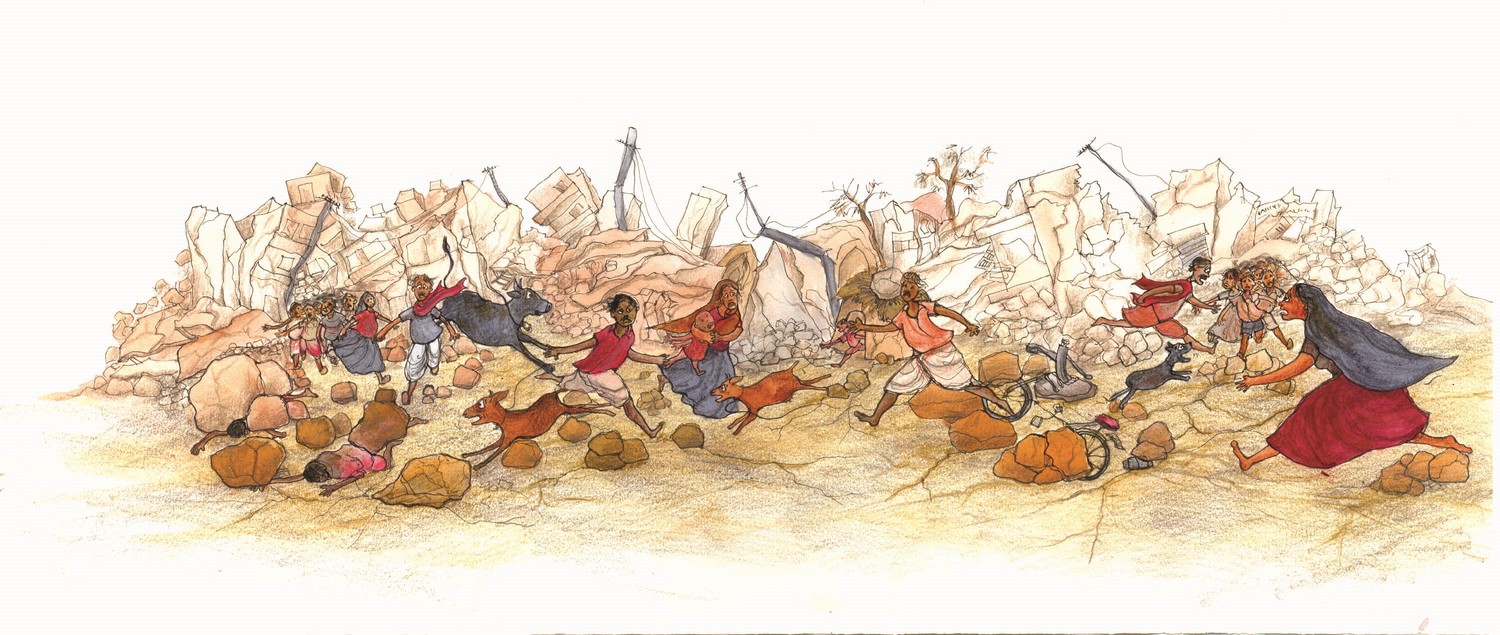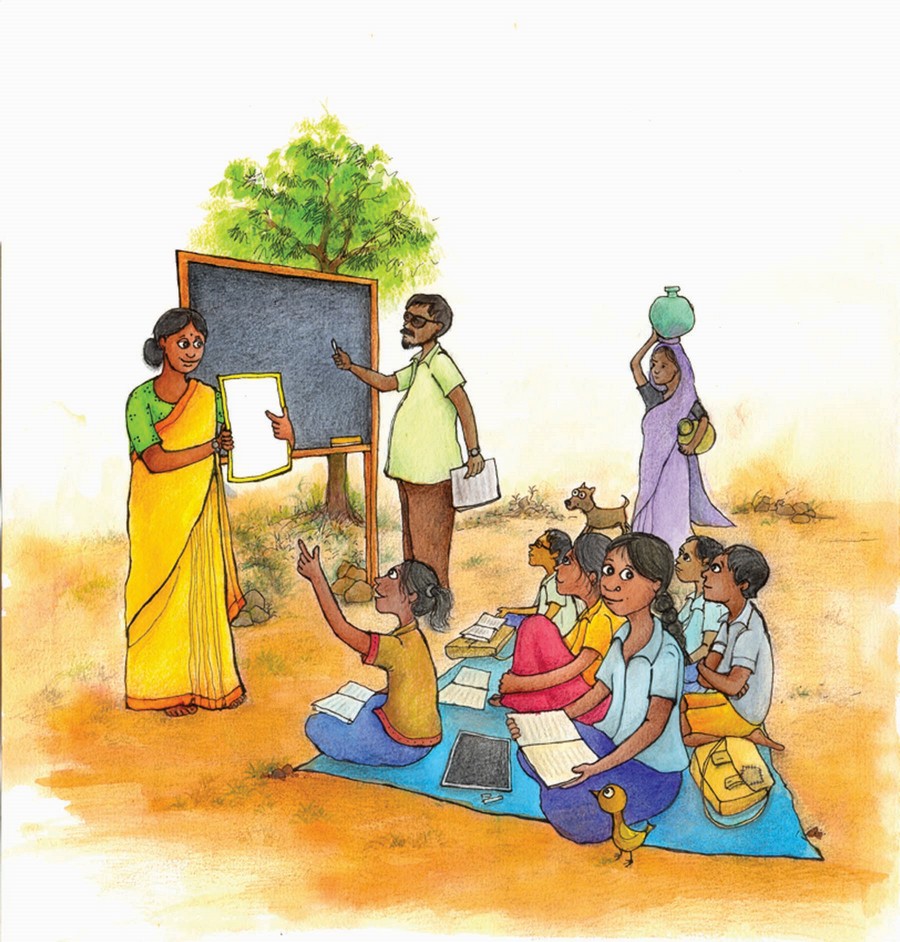Table of Contents
14. When the Earth Shook!
A bad dream
Help! Help! Save me! Aaahhh! Ooooww... There was screaming and shouting everywhere. The ground was shaking and people were running all around.
Screaming loudly I got up. On hearing me my mother also woke up. She came running and held me tight. It was the same bad dream! It has been more than six years now since the earthquake. But in my sleep I still feel the earth shaking and trembling.
I am Jasma. I live in the Kutch area of Gujarat. I was eleven years old when there was an earthquake.
It was 26 January, 2001. Everyone from the village - children and old people - had gathered in the ground of the school to watch the parade on TV. Suddenly the ground was shaking. People were scared and started running here and there. No one knew what was happening and what to do. There was Total panic

Teacher’s Note : Talking to children about the earthquake in Bhuj would help them understand the context. The effects of an earthquake can also be discussed.
In a few minutes, our village was flat on the ground. All our things-clothes, pots, grains and food - were trapped under the stones, mud and wood from the fallen houses. At that time everyone thought of two things - to save the people who were trapped and to treat the injured. The village hospital was also damaged. Many people were seriously injured. My leg also got fractured. The doctor treated people with the help of the villagers.

Six people of our village died. My grandfather (Nana) was also buried under the houses. My mother wept all the time. Seeing
my mother, I also cried. The entire village was sad and disturbed.
House of Motabapu who is the sarpanch of our village was not much damaged. He gave rice and wheat to everyone from his godown. For many days, the village women cooked food together at Motabapu's house and fed everyone.
Imagine, being without a house in the cold winter! Fear and the cold kept us awake in the nights. All the time we were worried that there may be another earthquake.
Discuss and write
- Have you or anyone that you know ever faced such difficulty?
- Who all helped at such a time? Make a list.
Help arrives
For some days after that, people from the cities kept coming to see what had happened. They came with food, medicines and clothes. Everyone used to rush to take these things. The clothes that we got were very different. We had never worn such clothes before.

People from different groups from the city, helped us to put up the tents. Staying in these plastic tents in the cold winter months was very difficult.
Some of these people were scientists. They tried to find out which areas have more chances of having an earthquake. People from our village talked to them many times. They had suggestions about building our houses again. Engineers and architects showed us some special designs for houses. They said that with this design, houses would not get damaged much in an earthquake. But our people were a little afraid. They thought if these people build our houses, our village will not look like our old village. So, the villagers thought they would build their own houses with their help. The groups would build the village school.

We all worked together to rebuild our village. Some people dug and brought the clay from the pond. We mixed the clay with cow dung and made large cakes. We put these on one another to make the walls. We whitewashed the walls and decorated them with beautiful designs and small pieces of
Teacher's Note: Talk to the children about government agencies and voluntary groups. For this, examples from their own area can be taken. A discussion can also be held on the kind of work engineers and architects do.

mirrors. We put up the thatched roof. Now our house shines like a diamond in the dark night!
Discuss
- A lot of people from other places came to Jasma's village.
Who were these people? In what ways would they have helped the villagers?
- People in Jasma's village rebuilt their houses with suggestions from the engineers. Will these houses be safer than before in case there is an earthquake again? Why?
- Think, if there were an earthquake where you live, would your house be in danger?
- What will you do to save pet animals during natural disaster?
Write
- Compare your house with that of Jasma. List in your notebook what materials were used in making both the houses.
Jasma's House | Your House |
----- | ----- |
What will you do?
People from the groups also made children in Jasma's school practice what they should do in case there is an earthquake. This is what they said:
- If possible leave the house and go to an open ground.
Teacher's Note: Talk to the children about what all can be done if there is a warning about such disasters.
- If you cannot go out of the house, lie down under a strong thing like a table and hold on tightly, so that it does not slip away. Wait until the shaking stops.

Come practice, what to do in an earthquake
- Have you been told in your school or anywhere else about what to do in case of an earthquake?
- Why do you think one should go under a table during an earthquake?
Who helped?
Read this TV report on the Bhuj earthquake.

Ahmedabad, January 26, 2001
At least a thousand people are feared dead in the earthquake that struck Gujarat this morning. Many thousands have been injured. Army jawans have been called in to help. At least a hundred and fifty buildings have fallen in the city of Ahmedabad. In these, there are a dozen multi-storeyed buildings. By this evening, around 250 bodies have been removed from these buildings. It is feared that several thousand people may still be trapped. Rescue efforts are on. There is perhaps no building in the city which has not developed cracks.
The situation in Bhuj is even worse.
People are running around in shock and panic. Within an hour of the earthquake the fire engines had reached and started work along with the local people. Offers to help are coming from all corners of the country and abroad.
Write
- According to the TV report, thousands of people were injured and some died in Gujarat. If the buildings had been made in a way that they would not fall in the earthquake, would the damage have been different? How?
- At times like this, when people have lost their homes and all their belongings, what kind of help would they need?
- In such situations whose help would be needed and for what? Write in your notebook as shown here.
Whose help will be needed | How will they help |
1. Dog 2. -------- | To smell out where people are lying trapped ------- |
Discuss
- Have you ever seen people in your area helping each other? When?
- Why do people live together in a neighbourhood?
- Imagine living in a place where there were no other houses or people around. How would it be? For example, whom would you play with? With whom would you celebrate festivals and special days? Would you be scared?
- People face a lot of difficulties when they lose people from their family, or their houses and belongings. In newspapers of the last one month, look for news related to such disasters - earthquakes, floods, fire, cyclones, etc., in different parts of the world. Collect these news reports and paste them in your notebook.
Your news report
- Make your own report which mentions the following:
- Cause of the disaster, date and time.
- What kind of damage did it cause - to lives, belongings, livelihoods?
- Which people came forward to help? Which government offices or other groups?
If there is no rain, crops can fail and there can be a drought. But food for people can be brought from other places so that there is no famine, which means people don't have to stay hungry, and they don't die of hunger.
- Have people in your area ever got affected by famine or drought? Find such reports of different countries from newspapers. Make your own report.
- You may need some help from these in case of an accident or emergency. Find out and write their addresses and phone numbers. Add more names to this list.
| Address | Phone Number |
Fire Station | ---------- | ---------- |
Nearby Hospita | ---------- | ---------- |
Ambulance | ---------- | ---------- |
Police Station | ---------- | ---------- |
Difficult times
Write a report with the help of the following words:
floods, river water, injured people, food packets, rescue work, camps, dead bodies, dead animals floating in water, houses under water, aerial survey (to see the scene of disaster from a plane), sad people, diseases spread by dirty water, homeless people, trapped people.
What we have learnt
What type of difficulties are faced by people during floods? Look at the picture, what kind of a school have the children come to after the flood? Write down what people had to do to make their life normal again after the flood.

Teacher's Note: In a discussion about the importance of a neighbourhood, various examples like daily interactions, weddings or a death in the neighbourhood can be taken. After collecting articles from the newspaper, children can work in different groups on different disasters. Discuss how different people are affected by disasters differently. For example, farmers are the most affected by floods, fishermen by tsunami, etc. Encourage children to watch film on disaster preparedness, assemble kits and participate in mock drills. Refer to the following weblinks - http://www.ndma.gov.in/en/
